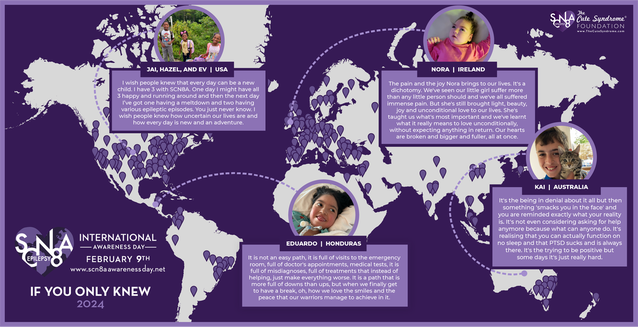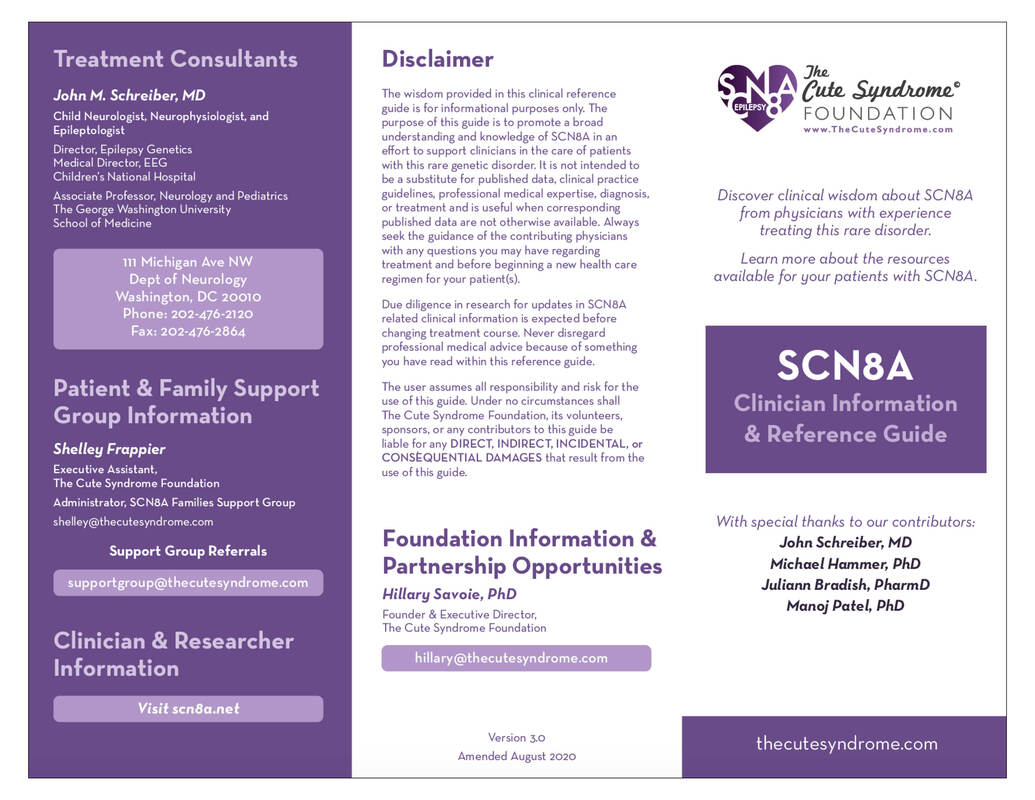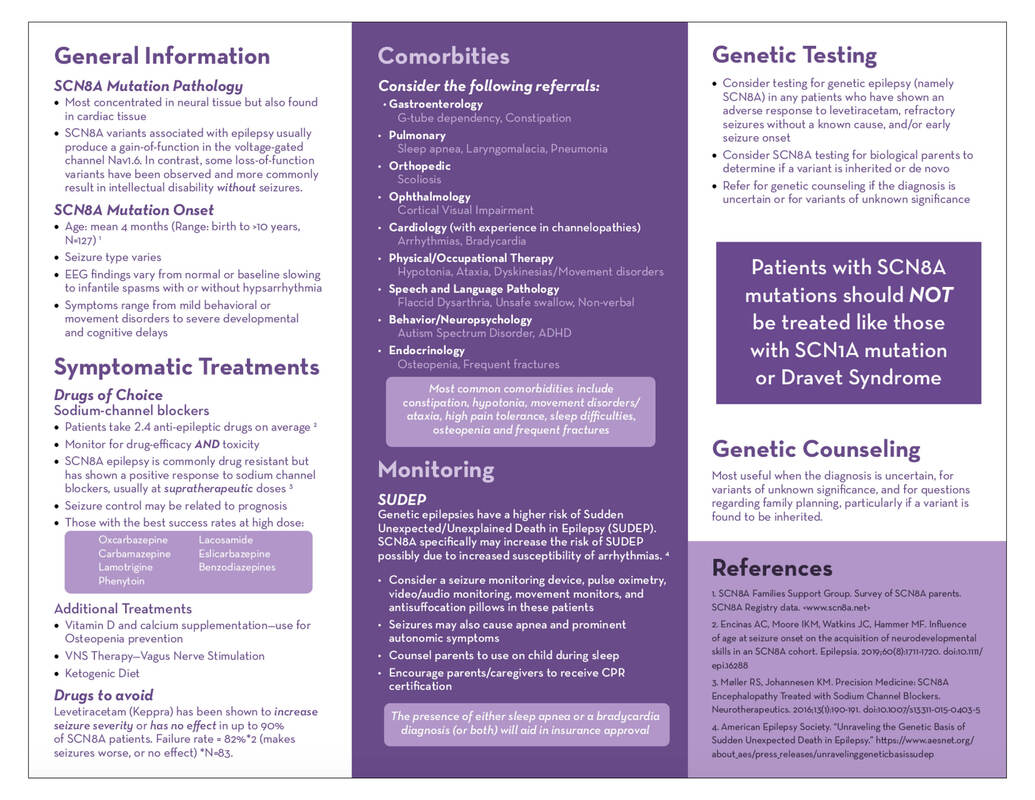
SCN8A is a rare disorder that causes a range of symptoms that can include severe epilepsy, developmental delay, and other medical challenges. Every person with this condition is affected differently and with varying severity. While choosing medications is a process of trial and error, with the help of several physicians, TCSF has developed a Clinician Reference Guide that can help guide your physician in best practices on medications to try (and to avoid).
What is SCN8A?
SCN8A is a gene that encodes a voltage-gated sodium channel and affects how brain cells function. Mutations on this gene can cause neurological problems that can include epilepsy and learning difficulties. The SCN8A gene was isolated in mice in 1995, and the role of SCN8A in the human brain was discovered in 2012. Since then, ~550 patients have been diagnosed with SCN8A mutations. Due to advances in genetic testing, more patients are being discovered all the time. It is now believed that SCN8A mutations may cause up to 1% of all epilepsies. Watch SCN8A 101 below to learn more...
What problems do SCN8A mutations cause?
Many with SCN8A mutations have epilepsy that is resistant to treatment - they may have seizures every day and need to be hospitalized often. Non-seizure symptoms often include learning difficulties, muscle spasms, low or high muscle tone, poor coordination, developmental delay, and autism spectrum disorder. Many children will have trouble learning to speak, and some will need assistance from feeding tubes to get the nourishment they need to grow.
Seizures in SCN8A Epilepsy typically onset between 0-18 months, at a mean age of 5 months. Seizures in SCN8A Epilepsy are often refractory—tonic-clonic seizures are the most typical, myoclonic and absence seizures are also common. Children with SCN8A mutations often have some degree of developmental delay which may occur from birth or onset with seizures. Many also have autistic-like features, hypotonia, and movement disorders—including dystonia and choreoathetosis. Learn more about some of our SCN8A warriors...
There is still much to be discovered about SCN8A and it's effects. While many have epilepsy and other medical challenges, some may develop fairly typically, and others may never have any seizures. It is important to get connected with our community and get involved in research, so we can understand the full spectrum of this disorder.
SCN8A Phenotypes
SCN8A-related disorders manifest in diverse phenotypes, each influenced by specific gene variants and their functional impact on sodium channels.
- Severe Developmental and Epileptic Encephalopathy (DEE): Characterized by severe neurological impairment and frequent, hard-to-control seizures. 24/7 care is often required.
- Mild/Moderate Developmental and Epileptic Encephalopathy: Characterized by epilepsy that is partially responsive to treatment. Often involves behavioral challenges, ataxia, and mild intellectual disabilities.
- Self-Limited (Familial) Infantile Epilepsy (SeL(F)IE): This phenotype often involves less severe symptoms that may resolve or significantly improve with age. Individuals usually maintain typical cognitive development.
- Neurodevelopmental Delay with Generalized Epilepsy (NDD w/ GE): Involves mild to moderate developmental delays accompanied by generalized epilepsy. May have developmental delays, behavioral issues, and ADHD and/or autism spectrum disorder.
- Neurodevelopmental Delay without Epilepsy (NDD w/o Epilepsy): This group experiences developmental delays without the presence of epilepsy, requiring a focus on supportive care and therapies aimed at improving developmental outcomes rather than seizure control.
¹International SCN8A Alliance. (2024, April 15). SCN8A Phenotypes: Insights into Care Strategies & Family Support. SCN8A Alliance. https://scn8aalliance.org/scn8a-care/scn8a-phenotypes/
What is the treatment for SCN8A?
There is currently no standard treatment for SCN8A. Treatment will depend on the type and severity of symptoms. SCN8A epilepsy is commonly drug-resistant but has shown a positive response to sodium channel blockers in many cases. A combination of treatments such as medications, implantable devices (VNS or RNS), or the ketogenic diet may be helpful.
There is currently one active clinical trial for SCN8A. The aim of the Kayak Study is to evaluate NBI-921352 as adjunctive therapy in subjects with SCN8A Developmental and Epileptic Encephalopathy Syndrome (SCN8A-DEE) in patients age 2-21. This is the first SCN8A-specific clinical trial and is a huge step forward for our community! Watch our Fall 2022 Clinical Trial Readiness series webinar with Neurocrine to get an update on this study.
A second SCN8A study is expected to initiate in the first quarter of 2023. The EMBOLD Study is a randomized, double-blind, placebo-controlled Phase 2 clinical trial to evaluate the safety, tolerability, efficacy, and pharmacokinetics of PRAX-562 in pediatric participants age 2-18 with DEEs, followed by an open-label extension. Watch our Fall 2022 Clinical Trial Readiness series webinar with Praxis to learn more about PRAX-562.
Prognosis for SCN8A-related Disorders
The prognosis for individuals with SCN8A mutations varies widely depending on the specific phenotype and the effectiveness of the treatment regimen. Generally, earlier diagnosis and treatment can improve outcomes, but many individuals with severe forms of the disorder may continue to experience significant challenges. Prognosis is also influenced by the responsiveness to treatment, with some individuals responding well to sodium channel blockers, while others may require a combination of medications and therapies to manage their symptoms effectively.
The prognosis for individuals with SCN8A mutations varies widely depending on the specific phenotype and the effectiveness of the treatment regimen. Generally, earlier diagnosis and treatment can improve outcomes, but many individuals with severe forms of the disorder may continue to experience significant challenges. Prognosis is also influenced by the responsiveness to treatment, with some individuals responding well to sodium channel blockers, while others may require a combination of medications and therapies to manage their symptoms effectively.
Where did the name "The Cute Syndrome" come from? Check out this blog post...
SCN8A Clinician Information and Reference Guide — Print your own!
More Information About SCN8A
Beyond the Ion Channel | Children's Hospital of Philadelphia | Epilepsy Neurogenetics Initiative at CHOP | Epilepsy Foundation | National Library of Medicine | International League Against Epilepsy | Science Direct
|
|
|
Do you or your child have an SCN8A mutation?
Join our SCN8A Community.
The gene SCN8A was isolated in humans by Michael Hammer, PhD, a geneticist who found the gene in his own daughter, Shay. We celebrate International SCN8A Awareness Day on February 9th in memory of Shay. You can learn more about Dr. Hammer and Shay in The Gene Detective's Journey:
|
Past Annual Reports
Past PCDH19 Efforts Privacy Policy The Cute Syndrome Foundation PO Box 842 Ozark, MO 65721 |
The Cute Syndrome is registered as a tax-exempt organization under IRS section 501(c)(3).
Our tax identification number is: 46-2699066. © The Cute Syndrome Foundation, All rights reserved |





